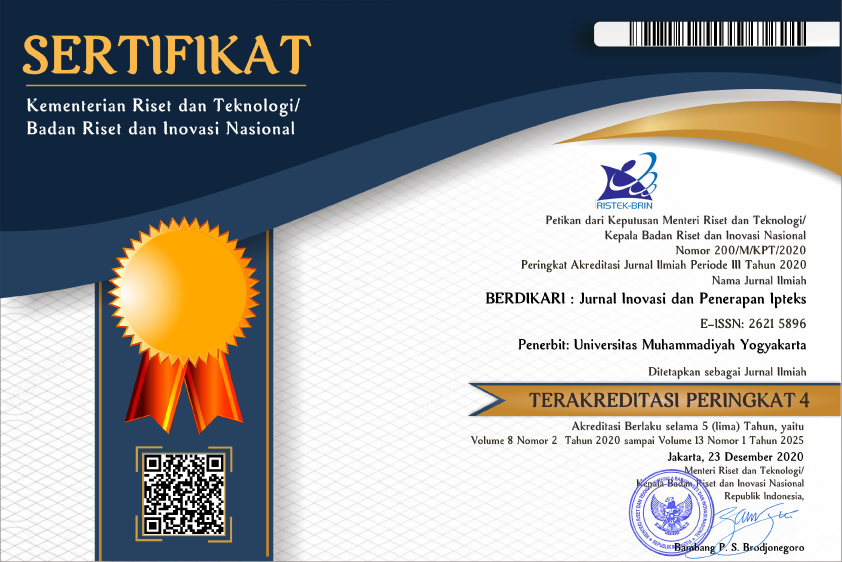Pengolahan Limbah Produksi Usaha Mikro, Kecil, dan Menengah Menjadi Kerajinan Kreatif
DOI:
https://doi.org/10.18196/berdikari.v10i1.10957Keywords:
economy, waste, incomeAbstract
Micro, small and medium enterprises (MSMEs) are community associations that carry out entrepreneurial activities closely related to the economic field. Through MSMEs, it is easier for people to collaborate with one another. One of the villages that strongly supports the development of SMEs is Gilangharjo Village. The great numbers of local MSME actors in the culinary field have greatly advanced the village economy. However, almost every day these MSME actors produce various kinds of waste from merchandise production. These problems can actually be handled by processing waste into creative crafts with economic value. The purpose of the service program is to increase the economic value of waste as an additional income for MSME actors. The socialization, training, and marketing assistance were coducted to assist them. The results of the program show that MSME waste can be processed into trinkets in Gilangharjo Village, and potentially increase the income of MSMEs in Gilangharjo Village.
References
Agnes Siwi Purwaning Tyas. (2017). Identifikasi Kuliner Lokal Indonesia dalam Pembelajaran Bahasa Inggris. Jurnal Pariwisata Terapan, Vol. 1, No.1.
Dyah Rini Indriyanti, Eva Banowati, Margunani. (2015). Pengolahan Limbah Organik Sampah Pasar Menjdai Kompos. Jurnal Abdimas, Vol.19, No.1.
https://gilangharjo.bantulkab.go.id (diakses pada 17/01/2021 pukul 13.30 WIB)
Iis Suwartini. (2020). Pelatihan Pendidikan Kesehatan Lingkungan Berbasis Nilai-Nilai Keislaman. Publikasi Hasil Pengabdian Kepada Masyarakat. ISSN 2580-2569.
Nyoman, Wardi. (2011). Pengelolaan Sampah Berbasis Sosial Budaya Upaya Mengatasi Masalah Lingkungan di Bali. Jurnal Bumi Lestari, Vol. 11, No. 1.
Reni Silvia Naution. (2015). Berbagai Cara Penanggulangan Limbah Plastik. Journal of Islamic Science and Technology, Vol. 1, No. 1.
Riswanda Himawan, Riefda Arya Kelana, Tika Afrilia, Agelia Sari. (2020). Pembentukan UMKM Melalui Program Hibah PHP2D Kemdikbud Sebagai Recovery Dampak Covid 19 di Desa Gilangharjo. Jurnal Pengabdian Dharma Laksana Mengabdi Untuk Negeri. Vol.3, No. 2.
Zairinayati, Nur Afni Maftukhah, Novianty. (2020). Pengelolaan Sampah Bernilai Ekonomi Berbasis Masyarakat. Jurnal Berdikari, Vo. 8, No. 2.
Downloads
Additional Files
Published
Issue
Section
License
Copyright
Authors retain copyright and grant BERDIKARI Jurnal Inovasi dan Penerapan IPTEK the right of first publication with the work simultaneously licensed under an Attribution 4.0 International (CC BY 4.0) that allows others to remix, adapt and build upon the work with an acknowledgment of the work's authorship and of the initial publication in BERDIKARI Jurnal Inovasi dan Penerapan IPTEK.
Authors are permitted to copy and redistribute the journal's published version of the work (e.g., post it to an institutional repository or publish it in a book), with an acknowledgment of its initial publication in BERDIKARI Jurnal Inovasi dan Penerapan IPTEK
License
Articles published in the BERDIKARI Jurnal Inovasi dan Penerapan IPTEK) are licensed under an Attribution 4.0 International (CC BY 4.0) license. You are free to:
- Share — copy and redistribute the material in any medium or format.
- Adapt — remix, transform, and build upon the material for any purpose, even commercially.
This license is acceptable for Free Cultural Works. The licensor cannot revoke these freedoms as long as you follow the license terms. Under the following terms:
- Attribution — You must give appropriate credit, provide a link to the license, and indicate if changes were made. You may do so in any reasonable manner, but not in any way that suggests the licensor endorses you or your use.
- No additional restrictions — You may not apply legal terms or technological measures that legally restrict others from doing anything the license permits.




